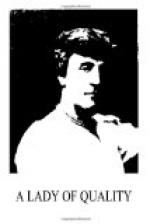It so chanced that the horse he rode the oftenest was her favourite, and many were the tempests of rage she fell into when she went to the stable to play with the animal and did not find him in his stall, because his master had ordered him out. At such times she would storm at the men in the stable-yard and call them ill names for their impudence in letting the beast go, which would cause them great merriment, as she knew nothing of who the man was who had balked her, since she was, in truth, not so much as conscious of her father’s existence, never having seen or even heard more of him than his name, which she in no manner connected with herself.
“Could Sir Jeoffry himself but once see and hear her when she storms at us and him, because he dares to ride his own beast,” one of the older men said once, in the midst of their laughter, “I swear he would burst forth laughing and be taken with her impudent spirit, her temper is so like his own. She is his own flesh and blood, and as full of hell-fire as he.”
Upon this morning which proved eventful to her, she had gone to the stables, as was her daily custom, and going into the stall where the big black horse was wont to stand, she found it empty. Her spirit rose hot within her in the moment. She clenched her fists, and began to stamp and swear in such a manner as it would be scarce fitting to record.
“Where is he now?” she cried. “He is my own horse, and shall not be ridden. Who is the man who takes him? Who? Who?”
“’Tis a fellow who hath no manners,” said the man she stormed at, grinning and thrusting his tongue in his cheek. “He says ’tis his beast, and not yours, and he will have him when he chooses.”
“’Tis not his—’tis mine!” shrieked Miss, her little face inflamed with passion. “I will kill him! ’Tis my horse. He shall be mine!”
For a while the men tormented her, to hear her rave and see her passion, for, in truth, the greater tempest she was in, the better she was worth beholding, having a colour so rich, and eyes so great and black and flaming. At such times there was naught of the feminine in her, and indeed always she looked more like a handsome boy than a girl, her growth being for her age extraordinary. At length a lad who was a helper said to mock her—
“The man hath him at the door before the great steps now. I saw him stand there waiting but a moment ago. The man hath gone in the house.”
She turned and ran to find him. The front part of the house she barely knew the outside of, as she was kept safely in the west wing and below stairs, and when taken out for the air was always led privately by a side way—never passing through the great hall, where her father might chance to encounter her.
She knew best this side-entrance, and made her way to it, meaning to search until she found the front. She got into the house, and her spirit being roused, marched boldly through corridors and into rooms she had never seen before, and being so mere a child, notwithstanding her strange wilfulness and daring, the novelty of the things she saw so far distracted her mind from the cause of her anger that she stopped more than once to stare up at a portrait on a wall, or to take in her hand something she was curious concerning.




